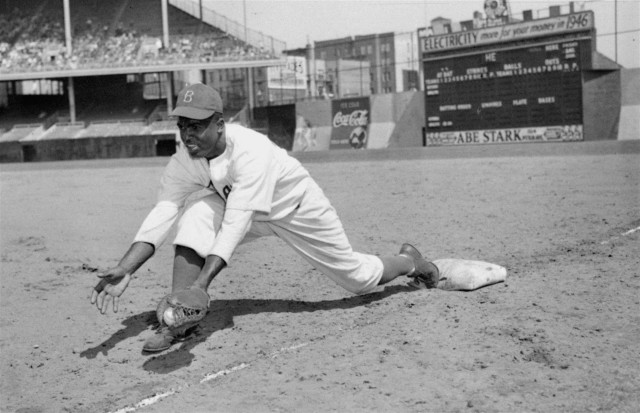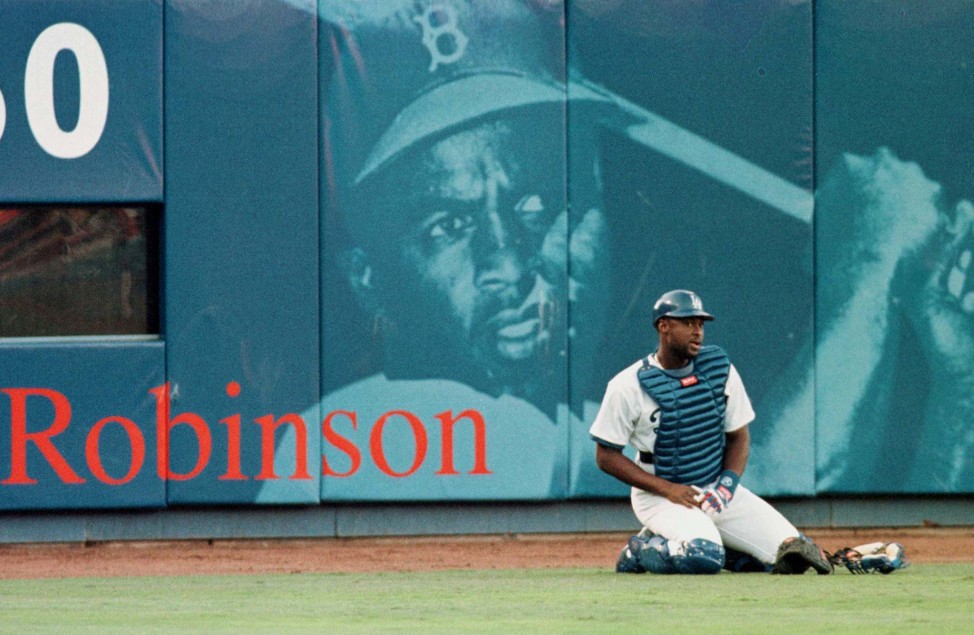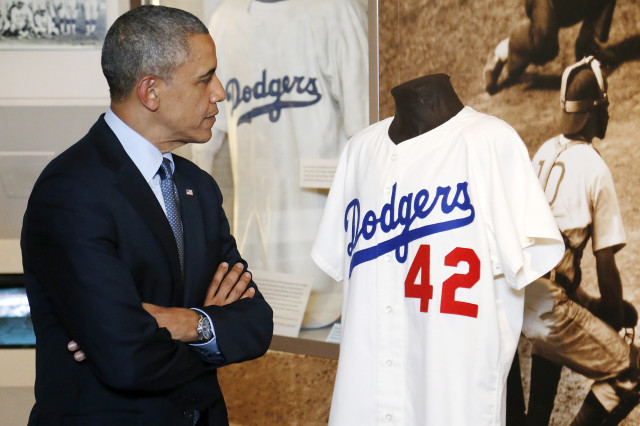Wearing number 42 emblazoned in blue on a white uniform, the first black man took the field in a major league baseball game 69 years ago today.

Jackie Robinson, Brooklyn Dodgers’ first baseman, is shown at Ebbets Field, April 11, 1947. (AP Photo)
Jackie Robinson did not get a hit, but he scored one run and his Brooklyn Dodgers won that game against the Boston Braves on April 15, 1947. And a tectonic shift took place in American society.
That first year was the hardest of Robinson’s 10 years playing baseball. He endured racial slurs, physical confrontations and death threats while showing America that a black man can compete with a white man. While it was a baseball field where Jackie Robinson competed, his courage and determination translated to all fields and aspects of American life.
Filmmaker Ken Burns, who has produced a new documentary on Robinson’s life, calls him “the most important person in the history of baseball.” Because of baseball’s status as the American pastime, he was one of the most important people in America.
Baseball honors Robinson by retiring his uniform number. No player wears his number in any game, except today, the anniversary of his first game, when every player wears Robinson’s number, 42, on their back, to honor the impact of his life.
Jackie Robinson, American hero.
The Unsanitized Story of Jackie Robinson
Howard Bryant – ESPN
President Barack Obama looks at a Jackie Robinson jersey as he tours the National Baseball Hall of Fame in Cooperstown, New York, May 22, 2014. (Reuters)
Although born from good intentions, the idea of Jackie Robinson the saint is a convenient, unfortunate concoction. It is true enough that Robinson changed America, and in turn, America changed with him….
The real Robinson, whole and unsanitized, was constantly human, competitive, flawed and pained, honorably naïve but always in determined opposition to the obstacles that prevented him from fulfilling a quest still unrealized some 44 years after his death: full partnership in the American dream for African-Americans. The real Robinson lives beautifully and heroically, inside a confectionary lie that his sainthood was something given by a redeemed America rather than taken from a resistant one.
How Politics Played a Major Role in the Signing of Jackie Robinson
Chris Lamb – The Conversation
The collapse of America’s economy during the Depression created a hunger for radical politics. The United States Communist Party sought to recruit blacks, in particular, because of the severity of racism in the United States. And communists believed they could win the hearts and minds of black Americans if they could desegregate professional baseball, which had prohibited blacks since the 19th century….
At the same time, labor unions organized picket lines and petition drives outside major league ballparks, collecting more than a million signatures. In July 1940, the Trade Union Athletic Association organized an “End Jim Crow in Baseball” demonstration at the New York World’s Fair.
The radical left also had friends in New York politics.

Los Angeles Dodgers catcher Charles Johnson stretches in front of a mural of baseball legend Jackie Robinson at Dodger Stadium before his debut game with the team May 16, 1998. (Reuters)
Jackie Robinson: Militant Black Republican
Leah Wright Rigueur – The Root
On a Saturday evening in February of 1966, over a thousand mostly white Republican men and women crowded into a Cleveland hotel banquet hall, eager to hear Jackie Robinson’s opening keynote for the annual Ohio Republican Conference. The baseball icon-turned-political activist did not disappoint.
“I am not what is known as a good Republican,” Robinson declared upon taking the stage. “I am certainly not a safe Republican. I am weary of the black man going hat in hand, shoulders hunched and knee pads worn, to ‘Uncle Tom’ to the enemies of our progress.”…
For years, conservatives have tried to claim the political legacy of Robinson without acknowledging his actual complicated “militant” politics….
“I’m a black man first,” he once calmly stated, while appearing on a 1968 television program, “an American second, and then I will support a political party—third.”
The origin story of the tradition of every player wearing No. 42 on #JackieRobinsonDay https://t.co/9LDmw2KwHm
— Yahoo Sports (@YahooSports) April 15, 2016
When Jackie Robinson Confronted a Trump-Like Candidate
Matthew Delmont – The Atlantic
“The danger of the Republican party being taken over by the lily-white-ist conservatives is more serious than many people realize,” Jackie Robinson cautioned in his syndicated column in August 1963. He was worried about the rise of Barry Goldwater, whose 1964 presidential bid laid the foundation for the modern conservative movement. Today, Goldwater’s shadow looms over Donald Trump’s campaign for the Republican Party’s nomination.
In 1964, unlike 2016, it was not a foregone conclusion that the vast majority of black voters would support the Democratic Party. Republicans Dwight Eisenhower and Richard Nixon received 39 percent and 32 percent of the black vote in the 1956 and 1960 presidential elections, compared to 6 percent for Goldwater in 1964. No Republican candidate since Goldwater has earned support from more than 15 percent of black voters.
“A new breed of Republicans has taken over the GOP,” Robinson wrote just after Goldwater claimed his party’s nomination. “It is a new breed which is seeking to sell to Americans a doctrine which is as old as mankind—the doctrine of racial division, the doctrine of racial prejudice, the doctrine of white supremacy.” He continued, “If I could couch in one single sentence the way I felt, watching this controlled steam-roller operation roll into high gear, I would put it this way, I would say that I now believe I know how it felt to be a Jew in Hitler’s Germany.”
A closer look at @adidasBaseball's special edition cleats for #JackieRobinsonDay. pic.twitter.com/rgY0pDwLaP
— adidasUSPRGuy (@adidasUSPRGuy) April 7, 2016


